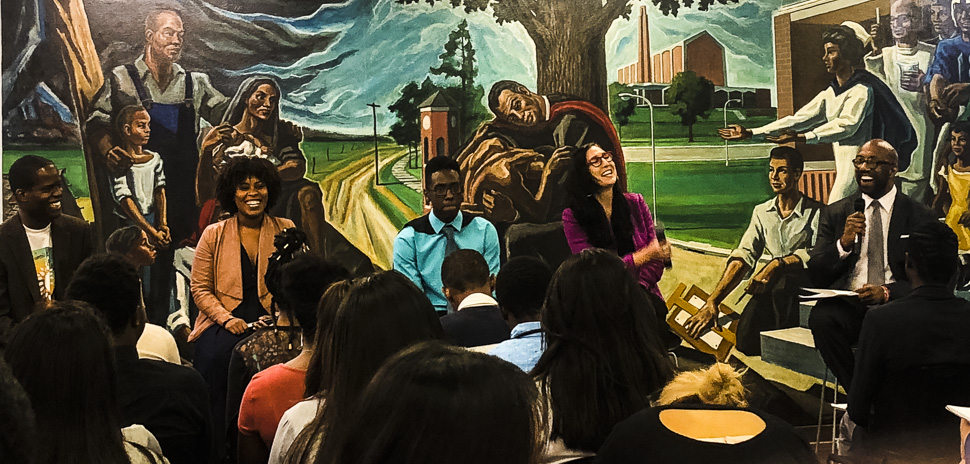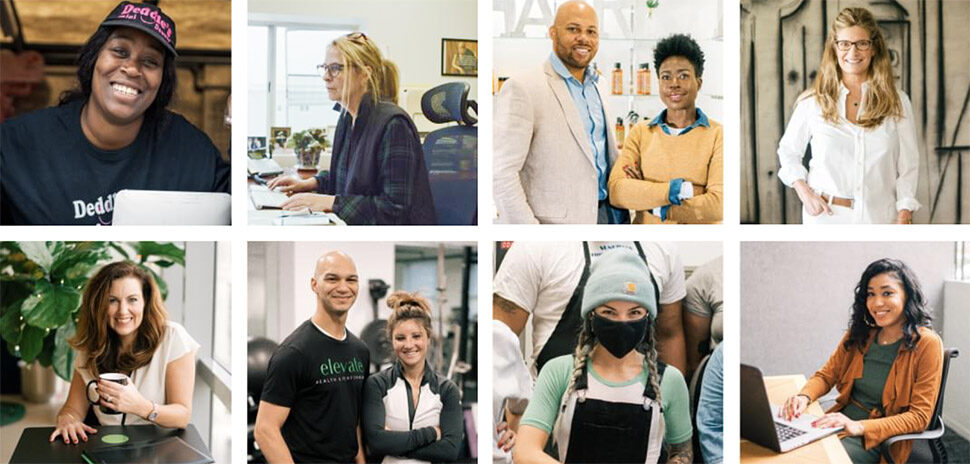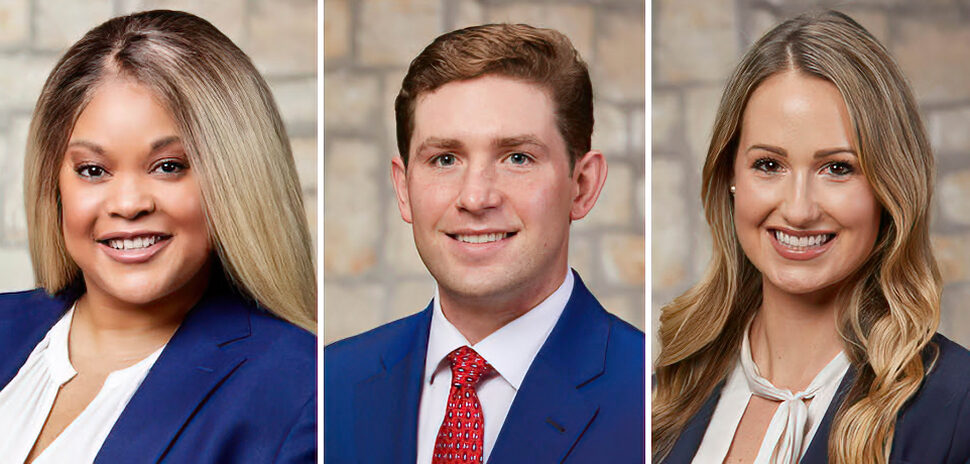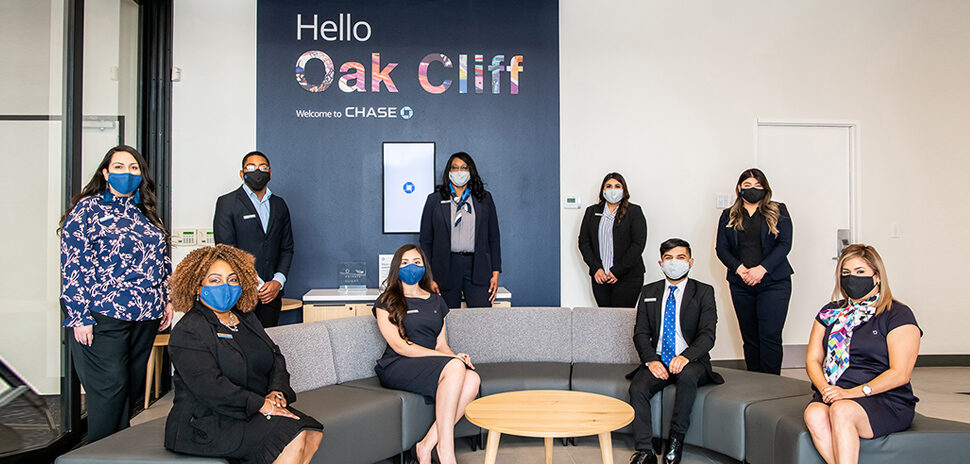From “Shark Tank” regrets, to getting rich, to superhero capes, the entrepreneurship panel at Paul Quinn College yesterday was full of laughs, advice, and emotional testimonials.
The speakers — all a part of AT&T’s Aspire Accelerator program — were guests at AT&T and PQC’s VIP Event, Entrepreneurship and Innovation: A Path to Economic Mobility. Aspiring entrepreneurs of all ages poured into the college’s Zale Library, eager to learn from the successful startups. The program was intended to showcase entrepreneurial resources available to diverse founders, and highlight the ventures participating this year in the Aspire Accelerator program.
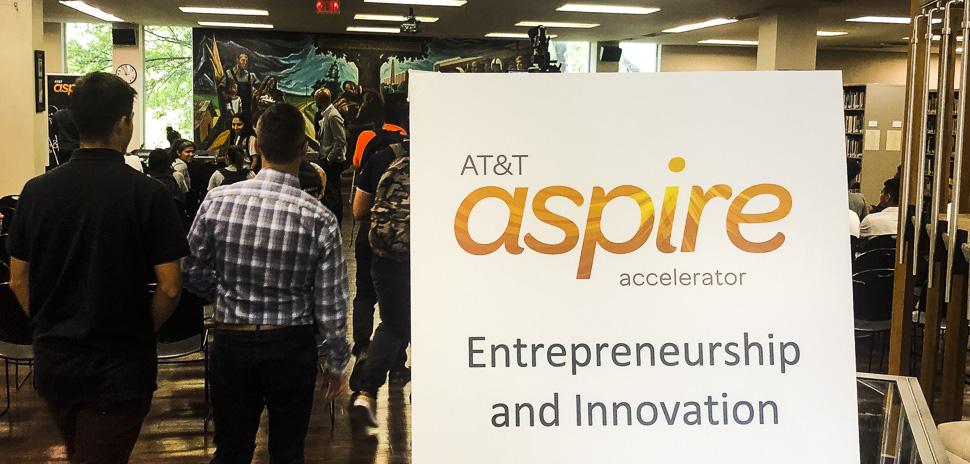
Guests filled the historic PQC library to hear from the AT&T Aspire Accelerator entrepreneurs. [Photo by Alex Edwards]
AT&T Director of Charitable Operations Kelem Butts said the telecommunications powerhouse is in its biggest transition in history, and the focus right now is developing the workforce of the future. He said education is a “big deal for Dallas,” and since headquarters are here, it’s important to make sure employees can live and work in the city.
With the 10-year Aspire Accelerator program, Butts said it was all about connecting with young people — specifically, students.
Education is a “big deal for Dallas,” and since headquarters are here, it’s important to make sure employees can live and work in the city.
Kelem Butts
The Aspire Accelerator works with technology-focused organizations that help students, schools, and communities succeed. The intent is to prepare “today’s learners for the jobs of tomorrow,” and show how technology is fundamentally changing the way we do this.
The accelerator kicked off in May with a new class, and those selected earned numerous benefits: a $100,000 AT&T Aspire investment and additional $25,000 to cover related costs, a four-to-six month customized program, access to AT&T and external mentors, flexible location, and opportunities to participate in various conferences and services.
When introducing yesterday’s event, Dr. Michael J. Sorrell, President of Paul Quinn College, described a similar approach to learning that he hopes his students are taking. He said it’s important to be entrepreneurial in thoughts and actions, and make sure to always bring something different to the marketplace.
AT&T + PQC Entrepreneurship Panel
Yesterday’s panel, moderated by Dr. Sorrell, featured four entrepreneurs from this year’s Aspire Accelerator class:
- Maxeme Tuchman, CEO of Caribu: a company that allows families to read and draw with their kids through an interactive video-call.
- Ashley Edwards, CEO of MindRight: a nonprofit that empowers youth of color to heal from systematic oppression trauma.
- Tony Weaver Jr., CEO of Weird Enough Productions: a media company that engages students through relatable comics, short videos, and podcasts.
- Felix Lloyd, CEO of Beanstack: an application that provides schools and libraries with tools for facilitating reading programs.

From left: Maxeme Tuchman, Ashley Edwards, Tony Weaver Jr., and Felix Lloyd. [Courtesy: AT&T and PQC]
If you’re interested in hearing from the entrepreneurs but couldn’t make the trip out to Paul Quinn, Dallas Innovates pulled a few hot takes from the panel to recap what you might’ve missed.
Give us a sample of what one of your days is like.
Edwards: Ashley said none of her days look the same, describing her weeks as “every day is Friday and no day is Friday.” She’s constantly in-and-out of the office meeting with students.
Weaver: The most important thing for Tony was that work was done every day at 5 p.m. He said it was vital to have a stopping point for the day — or else he’d just never stop.
Tuchman: While the other three entrepreneurs said they wake up early, Maxeme was unique in that she worked 20 hours a day, but actually went to sleep at 5 a.m. She said sometimes she feels like the next billionaire, and other times like the biggest failure — “reality can kick you in the teeth.”
How do you get rich being an entrepreneur?
Lloyd: Felix said it was all about “working hard to be lucky,” and entrepreneurship was more about solving a big, painful problem than making money.
Edwards: Ashley is different from the rest of the panel because she leads a nonprofit. She said you have to be obsessed with your work, and you have to be willing to risk it all. This is what she wanted her life’s work to be, and she doesn’t think she could ever walk away from it.
Tuchman: 90 percent of people fail, Maxeme said, so don’t get into entrepreneurship for the salary. In her first year, she was bootstrapped, and focused instead on the long-game.
Lastly, the floor opened to final anecdotes and crowd questions.
Weaver: Tony showed up to the panel wearing a superhero cape, which was representative of both his business and his personal journey. He told the students present they were “never too weird” and they should always “love their truth.”
Lloyd: Although Felix thinks this is the Golden Age of entrepreneurship right now, his journey has been a “roller coaster he couldn’t get off.” He shared his story of Mark Cuban investing in him on “Shark Tank,” but then watching the episode air and realizing the original business model didn’t work. He even had a panic attack that night — but was able to adapt and turn the company around.
Tuchman: When a student asked Maxeme how she stays collected during the trials and tribulations of being an entrepreneur — between laughter — she said nobody has ever referred to her as ‘calm’ before. She shared a story about risking everything to start her business, saying you had to do things like eat chicken nuggets and sleep on friends’ couches.
To learn more about yesterday’s event, visit the official website here.
![]()
Get on the list.
Dallas Innovates, every day.
Sign up to keep your eye on what’s new and next in Dallas-Fort Worth, every day.

